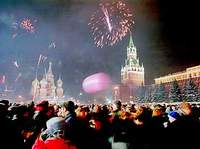Millions of Russians return to work after lengthy New Year holidays
Most people have long resumed the daily grind after New Year celebrations, but millions of Russians only returned to work this week - stumbling back to reality after an official holiday whose length is the subject of public and parliamentary debate and even psychologists' tips on how to recover.

The same lawmakers who approved the 10-day holiday less than three years ago are expected to consider cutting short a break that for many Russians means an excessive intake of fatty food, hard drink and bad television.
"I'm tired, I can't deal with it," complained Marina Kozhukhova, a Muscovite who said Friday that she was still trying to readjust to her daily routine.
The long holiday is a product of Russia's mix of Soviet-era traditions with those of the resurgent Russian Orthodox Church, which celebrates Christmas on Jan. 7 because it retained the Julian calendar when Bolshevik leader Vladimir Lenin switched the country to the Gregorian calendar.
As under Communism, New Year's is the main winter holiday and the occasion for exchanging gifts, but a Christmas holiday was added after the Soviet collapse.
Little gets done in the few days between New Year's and Christmas - promises to take care of matters "after the holidays" are a bureaucratic standard - and President Vladimir Putin signed a law late in 2004 that essentially links the two, creating a break that cannot be shorter than 10 days.
For some Russians, it's even longer. Government officials returned to work Tuesday, but many others won't be back until this coming Monday, extending their time off until after what is called the "Old New Year" on Jan. 13 - New Year's Day under the old Julian calendar.
One complaint about the long holiday is that it suits Russia's political and business elite but is of little use to those who cannot afford trips abroad. Family budgets, already strained by New Year gifts and holiday meals, are stretched further as they spend on keeping themselves and their children occupied.
With school out during the holiday, Muscovites scramble to find tickets for a "yolka" - literally a fir tree - a seasonal children's play featuring Grandfather Frost, Russia's answer to Santa Claus, and his female sidekick, the Snow Maiden.
On mostly state-controlled television, meanwhile, adults are fed a steady diet of Soviet-era movies and made-for-TV holiday extravaganzas that, even for fans, can get tiring after a few days. For others, it happens much faster.
Critics say the holiday's length encourages alcohol abuse, aggravating Russia's drinking problem.
"If you drink, it seems to pass in one day," said hairstylist Valery Chesnokov, 43. "If you don't drink, it seems long."
Lawmakers are expected to discuss the issue later this year, amid calls for shortening the holiday and restoring more time off around May Day. That wold satisfy critics who say that in May they can use free time to sow potatoes in backyard plots, while time off in January is time lost.
Meanwhile, experts have advice for Russians trying to recover after 10 days off, the AP says.
"To regain strength, one should go to bed early and get enough sleep, and also pay attention to one's intestines ... and stop eating too much," the New Region news agency quoted Mikhail Pertsel, the chief state psychotherapist for the Sverdlovsk region in the Ural mountains, as saying.
He said that the period of recovery from the holidays depends on the individual, but that "by Monday, Russians will have to return to the normal rhythm of life."
Subscribe to Pravda.Ru Telegram channel, Facebook, RSS!


